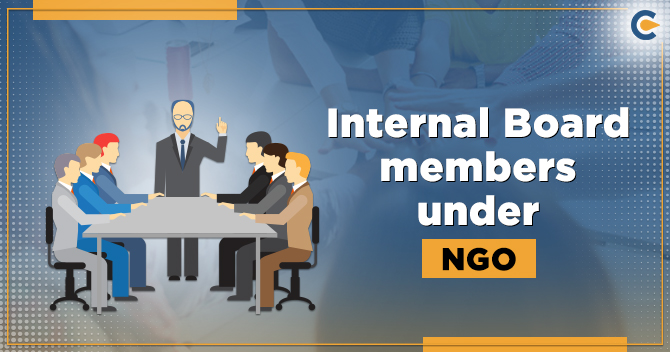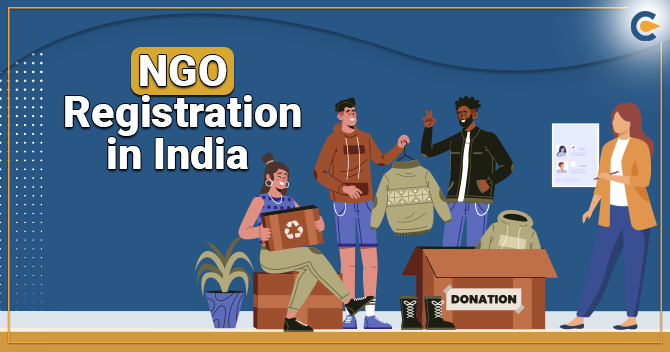In today’s world, society tends to change drastically and people are aware of the necessity of social interaction. Fulfilment of social needs by any NGO should be an utmost priority. In order to fulfil those needs and keeping up with the change, society needs dedicated, determined and responsible non-profit organisations and leaders. There is a need for NGO registration, to make the NGOs more credible, effective, productive and righteous in nature. One major factor, which is necessary to achieve these objectives includes selection of the members on the board. Structuring an efficient Internal Board Members under NGO can lead to successful implementation of plans, strategies and objectives of an NGO.
Need for Internal Board Members under NGO
It is known that a great leadership may bring a huge amount of positive change in the society as the essence of a healthy leadership is creating an influence upon the people and not imposing some sort of authority.
For efficient functioning of an NGO, it is essential to involve sufficient number of members who are appreciated, recognised and trusted among the people they serve. An NGO should appoint a team of professionals possessing relevant financial and technical skills related to the aspects, an NGO deals with.
There should be a balance in the members of the boards and each voice should be heard. Forming a balanced board is a difficult task; however, it is necessary on ethical grounds, in order to attain efficiency and productivity. Members on the board of an NGO are referred to by various names such as Steering Committee, BOD (Board of Directors), Advisory group, administration etc.
Composition of an NGO Administration Board
The administration board of an NGO is comprised of ten to fifteen members, who are appointed as President, Trustee, Treasurer and other designations with specific purposes related to functioning area of an NGO. The tenure of the appointed members generally ranges for one to three years, and positions of members could be rotated or renewed depending upon the circumstances.
Questions to Consider before the Appointment of the Internal Board members
- How can the said person relate to the problems that the NGO confront while working?
- How much ground experience does he/she have?
- Do his or her skills bring any relevant change in the system?
- Does the personal experience of the said person is different from the reality?
- How is the said person similar to other members of the board?
- What does the word “Difference” mean to him and how does he or she look forward it?
- Where does the said person see the world in near future, and what are his or her ideas of an ideal world?
Read our article:Everything you need to know about Statutory Controls of NGO
Board of an NGO
The board of an NGO is generally divided into Four Categories:


The main objective of the administration is to formulate policies and framework aiding the vision and mission of the organisation. They act as the legal owners of the organisation. The administration monitors the performance of the organisation and ensures its stability. Trustees of an NGO are appointed at the Annual general meetings of the board and their tenure is also specified in the same meeting.
Who are the Internal Board members?
Under the Internal Board of a Non-Profit Organisation, the members aid in recognising and linking the Organisation to appropriate stakeholders or professionals who have the potential to help the organisation in achieving its mission.
The members of the internal Board also provide assistance in encouraging and promoting the project activities formulated by the board and also keeps a check on the outputs. The members of the internal board can also suggest and provide their opinions when asked, on day to day activities of the organisation. The internal board members under NGO can also be summoned to intervene and resolve the conflicts of the organisation and act as a neutral third party and providing an impartial decision.
Who are the External Board members?
The external members of a non-profit organisation are required to recognise potential projects and to propose projects supporting the ideas of the organisation. In Majority of the cases, the external Board members are appointed as per their potential to raise funds and donations for activities of the organisations.
The members of the external boards are also allowed to recruit and suggest apt and diligent professionals who have the potential to work for the organisation. The external board also plays an essential role in ensuring that all the relevant national laws, rules and regulations related to the functioning of an NGO are followed by the said organisation including the financial matters.
Qualification Required to be Appointed as an Internal Board members under NGO
The member of the Board should have relevant skills and knowledge required for the functioning of an organisation. They should have basic understanding of the scope of the organisation. They should have front-line experience and responsibilities to perform the tasks and role of the board. Issues related to Non Governmental Organisation are represented through the Board members.
Requirements by Internal Board Members under NGO
- The internal board members under NGO are required to have minimum years of experience in working of an NGO.
- They should possess the ability to communicate.
- They are required to have the ability to represent and promote the organisation on a public platform.
- They should be gender-sensitive, unbiased, should posses political skills, logical and reasoning skills.
- They should believe in the welfare of the people and the state and should prioritise nation above all.
- They should have the knowledge of local languages[1] and should have effective communication skills.
Methods to be used by the Internal Board Members under NGO
- The board meetings should be punctual and organised, to promote the idea of discipline among all.
- They should concede fund raising qualities with great targets, which is a MUST SKILL for any NGO.
- Ask the members of the Boards to work efficiently and promote the NGO on social platform so it can be recognised widely.
- Ask the members to regularly drop off the names of the acquaintances that might be interested in donations and send them personal notes and request letters.
- Set high expectations and keep encouraging the members and the volunteers.
Conclusion
With the changing dynamics of the society, needs and wants of people have also changed radically irrespective of what class or status they belong to.
To keep pace with the changes and fulfilment of basic requirements of the society, there is a growing need of proper functioning of non-governmental organizations. The management and functioning of an NGO lies within its members and their effectiveness, hence, a balanced internal board members under NGO is a pre requisite in achieving objectives of an NGO.
Read our article:Understanding on the Power of Commissioner under NGO Registration











